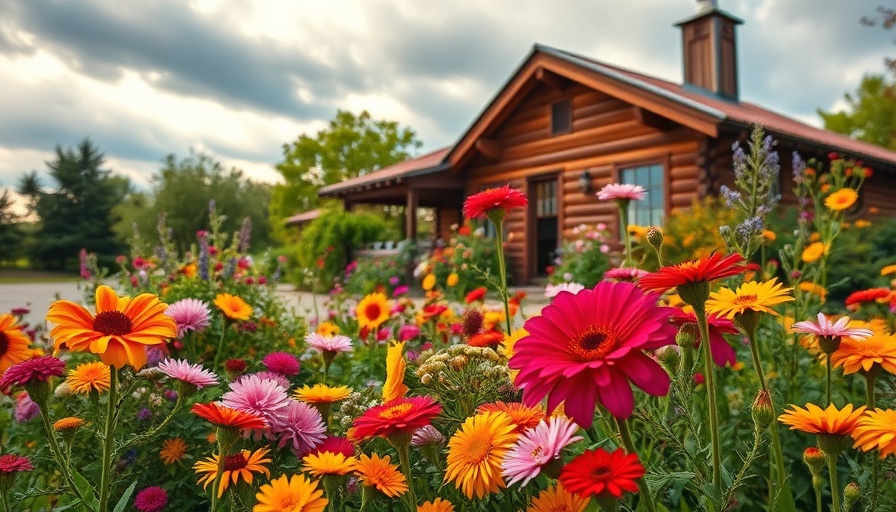
The Dire Decline of Insect Populations
Insects are disappearing at an alarming rate, with the Bugs Matter Citizen Science Survey revealing a shocking 63% decline in bug splatter across the UK since 2021. This drastic reduction poses a threat not only to our ecosystems but also to the agriculture sector and the overall health of our environment. The implications are profound: as we lose these essential creatures, we also jeopardize their critical roles in pollination, pest control, and soil enrichment.
Practical Steps to Help Insects Thrive
At a time when their existence hangs in the balance, individuals can take meaningful actions to support insect populations. Here are eight straightforward strategies designed to create welcoming habitats for these important creatures:
1. Turn Off Unnecessary Lights at Night
Artificial lighting disrupts the natural behaviors of insects. Notably, many nocturnal species become disoriented by man-made lights, leading to their demise. To help combat this, consider turning off lights at night, using timers, or utilizing shades to reduce light pollution. Simple modifications can make a substantial difference in maintaining insect populations.
2. Let the Leaves Lie
Embracing a messier garden can have significant benefits. By leaving leaves undisturbed, you create a vital habitat for various insects. Raking leaves can drastically reduce spider and butterfly populations—showing that a bit of nature’s chaos can help foster life. Furthermore, allowing fallen branches and logs to decay will provide food and shelter for beetles and bees.
3. Plant Pollinator-Friendly Flowers
An effective way to encourage insect visitation is by curating a garden that attracts pollinators. Using the "3 x 3 x 3" method, select three native flowering species for each season. This diversity will not only attract different pollinators all year long but also support the interdependent relationships between insects and plants.
4. Keep Water Accessible
In the face of climate change and rising temperatures, insects, like all wildlife, require stable access to water. Simple features like shallow puddles or bird baths can serve as essential water sources for insects struggling under heat stress, supporting their overall health and survival.
5. Create A Habitat for Wildlife
Beyond just flowers, fostering biodiversity means creating spaces where various wildlife can thrive. Consider setting up nature reserves or leaving sections of your gardens wild to support a range of creatures; from native bees to beneficial wasps, these habitats protect local ecosystems.
6. Embrace Chaos Gardening
Rather than an impeccably manicured lawn, a diverse and somewhat chaotic garden can be more beneficial for insects. This philosophy borrows from the concept of chaos gardening, which supports plant diversity and mimics natural growing conditions—essential for fostering healthy insect populations and promoting resilience against pests.
7. Minimize Use of Plastics
The use of sterile plastics poses significant risks to our environment, including microplastics that can permeate the ecosystem. Transitioning to sustainable materials, like leather alternatives or bioplastics, can help mitigate these risks. Reducing plastic usage helps preserve the habitats insects rely on and contributes to overall environmental health.
8. Practice Climate Awareness
Understanding the impacts of climate change on ecosystems is crucial. Engage with community efforts aimed at raising awareness about climate-related issues, helping others learn how their choices affect insect populations, and promoting thriving ecosystems.
Relevance to Sustainable Hospitality
For home owners and boutique hospitality professionals, adopting these practices not only enhances the local ecology but can also create a unique selling proposition. People are increasingly seeking eco-conscious experiences; promoting gardens that support pollinators can enhance brand image and attract environmentally aware clientele. The involvement in local ecological preservation aligns with the growing trend toward sustainability in travel and hospitality, where every small action contributes to larger systemic changes.
Call to Action
As a responsible steward of the environment, it’s crucial for everyone in the hospitality sector to invest in practices that foster biodiversity and support insect populations. Start by implementing one or two of these strategies today, and encourage colleagues and guests to participate in this essential effort. Together, we can create a thriving ecosystem, one small step at a time.
 Add Row
Add Row  Add
Add 




Write A Comment